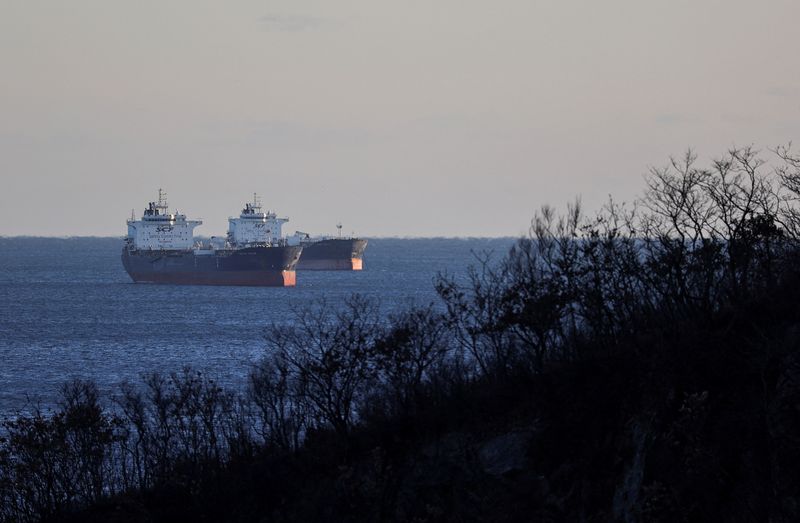By Natalia Chumakova, Ahmad Ghaddar and Trixie Yap
MOSCOW/LONDON/SINGAPORE (Reuters) - Russia said on Sept. 21 it had temporarily banned gasoline and diesel exports to all but four ex-Soviet states in response to domestic shortages, a move that will disrupt global trade that has already had to adjust to Western sanctions on Russian fuel exports.
Russia eased some of the restrictions on Sept. 25, saying itwould allow the export of bunkering fuel for some vessels anddiesel with high sulphur content. The government has yet to give a timeline for any further easing of restrictions.
Analysts say importers will have to find alternative sellers until Russia can replenish its own stocks.
WHAT CAUSED THE PROBLEM?
Traders said the fuel market in Russia, one of the world'sbiggest oil producers, was hit by a combination of factorsincluding maintenance at oil refineries, bottlenecks on railwaysand the weakness of the rouble, which incentivises fuel exports.
Russia tried to tackle the diesel and gasoline shortages inrecent months but turned to export curbs to prevent a fuelcrisis, which could be awkward for the Kremlin as a presidentialelection looms in March.
Deputy Prime Minister Alexander Novak said on Oct. 4 that the restrictions were working, adding inventories had increased by 430,000 metric tons since they were introduced.
HOW BIG A PROBLEM IS THIS FOR WORLD FUEL MARKETS?
The diesel ban will have the biggest impact because Russiais the world's top seaborne exporter of the fuel, just ahead ofthe United States.
It shipped an average 1.07 million barrels per day (bpd) ofdiesel from the start of the year to Sept. 25, accounting formore than 13.1% of total seaborne diesel trade, according tooil analytics firm Vortexa.
Russia is a much less significant gasoline exporter, shipping an average 110,000 bpd from Jan. 1 to Sept. 25, Vortexa said.
HOW LONG WILL THE BAN LAST?
Russia said exports would resume once it had stabilised itsdomestic market, but did not give a timeframe.
The daily Kommersant reported on Oct. 4 that the Russian government was ready to ease the diesel export ban in the coming days, citing unidentified sources.
TASS news agency cited Energy Minister Nikolai Shulginov as saying the government "at all levels" had been discussing partial permission for fuel exports.
Analysts, such as consultancy FGE Energy, said the ban ondiesel could last up to two weeks before Russia replenishes itsstocks and resumes exports.
Expectations for the length of the gasoline ban vary. JPMorgan (NYSE:JPM) said it could last a couple of weeks until harvest seasonconcludes in October, while FGE Energy said replenishingRussia's gasoline stocks could take up to two months.
WHO WILL BE MOST AFFECTED?
After the European Union banned Russian fuel imports overMoscow's invasion of Ukraine, Russia diverted Europe-boundexports of diesel and other fuels to Brazil, Turkey, severalNorth and West African countries and Gulf states in the MiddleEast. Gulf states, which have their own major refineries,re-export the fuel. The Russian ban will change those flowsagain.
Diesel supplies from Russian ports to Brazil reached about 4million tons from Jan. 1 to Sept. 25, compared with74,000 tons in all of 2022, LSEG data showed. The Russian fuelreplaced Brazil's imports of diesel from the United States.
A prolonged Russian ban on diesel exports could force Brazilto replace up to 400,000 tons of the fuel per month, marketsources said.
Turkey was the top destination for diesel supplies fromRussian ports after the EU embargo, which totalled about 7million tons since the start of this year, but it will still beable to buy Russian high-sulphur gasoil, traders added.
WHERE WILL ALTERNATIVE SUPPLIES COME FROM?
African states are expected to turn to supplies of gasoiland diesel shipped from the Middle East, India and Turkey,trading and shipping sources said.
At least 132,000 tons of September-loading diesel will beheading to Africa from Oman's new Duqm refinery, shiptrackingdata from Kpler and two shipbroking firms showed.
Latin American importers are likely to turn to the U.S. GulfCoast and the Middle East, traders said.
Diesel exports from the Middle East to Latin America were atan eight-month high of 315,000 tons, shiptracking data fromKpler and a shipbroking source showed.
Europe could also fill some of the gap left by the Russiagasoline ban. Northwest European suppliers, which lost marketshare in West Africa to Russian supplies this year, could stepin, FGE said.
WHAT WILL THE CHANGE IN FUEL TRADE FLOWS MEAN FOR EUROPE?
Since banning Russian fuel imports, Europe has been seekingsuppliers elsewhere, including from the Middle East. Competitionfor those supplies will now increase because of Russia's ban,which will have a knock-on impact on Europe.

As a result, traders said they expected Northeast Asianrefiners in China and South Korea to boost diesel exports toEurope.
China exported about 190,000 tons of diesel to Europe inSeptember, with 45,000 tons scheduled to load in October alsobound for Western countries, Kpler shiptracking data and datafrom one shipbroking source showed.